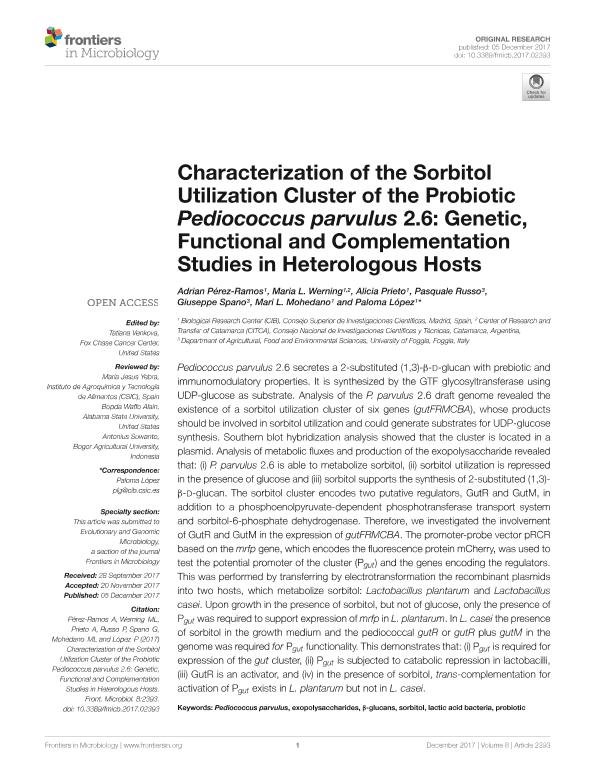Mostrar el registro sencillo del ítem
dc.contributor.author
Pérez Ramos, Adrian
dc.contributor.author
Werning, María Laura

dc.contributor.author
Prieto, Alicia
dc.contributor.author
Russo, Pasquale
dc.contributor.author
Spano, Giuseppe
dc.contributor.author
Mohedano, Mari L.
dc.contributor.author
López, Paloma
dc.date.available
2018-04-10T15:26:06Z
dc.date.issued
2017-12
dc.identifier.citation
Pérez Ramos, Adrian; Werning, María Laura; Prieto, Alicia; Russo, Pasquale; Spano, Giuseppe; et al.; Characterization of the sorbitol utilization cluster of the probiotic Pediococcus parvulus 2.6: Genetic, functional and complementation studies in heterologous hosts; Frontiers Media S.A.; Frontiers in Microbiology; 8; 12-2017; 1-17
dc.identifier.issn
1664-302X
dc.identifier.uri
http://hdl.handle.net/11336/41495
dc.description.abstract
Pediococcus parvulus 2.6 secretes a 2-substituted (1,3)-β-D-glucan with prebiotic and immunomodulatory properties. It is synthesized by the GTF glycosyltransferase using UDP-glucose as substrate. Analysis of the P. parvulus 2.6 draft genome revealed the existence of a sorbitol utilization cluster of six genes (gutFRMCBA), whose products should be involved in sorbitol utilization and could generate substrates for UDP-glucose synthesis. Southern blot hybridization analysis showed that the cluster is located in a plasmid. Analysis of metabolic fluxes and production of the exopolysaccharide revealed that: (i) P. parvulus 2.6 is able to metabolize sorbitol, (ii) sorbitol utilization is repressed in the presence of glucose and (iii) sorbitol supports the synthesis of 2-substituted (1,3)-β-D-glucan. The sorbitol cluster encodes two putative regulators, GutR and GutM, in addition to a phosphoenolpyruvate-dependent phosphotransferase transport system and sorbitol-6-phosphate dehydrogenase. Therefore, we investigated the involvement of GutR and GutM in the expression of gutFRMCBA. The promoter-probe vector pRCR based on the mrfp gene, which encodes the fluorescence protein mCherry, was used to test the potential promoter of the cluster (Pgut) and the genes encoding the regulators. This was performed by transferring by electrotransformation the recombinant plasmids into two hosts, which metabolize sorbitol: Lactobacillus plantarum and Lactobacillus casei. Upon growth in the presence of sorbitol, but not of glucose, only the presence of Pgut was required to support expression of mrfp in L. plantarum. In L. casei the presence of sorbitol in the growth medium and the pediococcal gutR or gutR plus gutM in the genome was required for Pgut functionality. This demonstrates that: (i) Pgut is required for expression of the gut cluster, (ii) Pgut is subjected to catabolic repression in lactobacilli, (iii) GutR is an activator, and (iv) in the presence of sorbitol, trans-complementation for activation of Pgut exists in L. plantarum but not in L. casei.
dc.format
application/pdf
dc.language.iso
eng
dc.publisher
Frontiers Media S.A.
dc.rights
info:eu-repo/semantics/openAccess
dc.rights.uri
https://creativecommons.org/licenses/by-nc-sa/2.5/ar/
dc.subject
Exopolysaccharides
dc.subject
Lactic Acid Bacteria
dc.subject
Pediococcus Parvulus
dc.subject
Probiotic
dc.subject
Sorbitol
dc.subject
Β-Glucans
dc.subject.classification
Otras Ciencias Biológicas

dc.subject.classification
Ciencias Biológicas

dc.subject.classification
CIENCIAS NATURALES Y EXACTAS

dc.title
Characterization of the sorbitol utilization cluster of the probiotic Pediococcus parvulus 2.6: Genetic, functional and complementation studies in heterologous hosts
dc.type
info:eu-repo/semantics/article
dc.type
info:ar-repo/semantics/artículo
dc.type
info:eu-repo/semantics/publishedVersion
dc.date.updated
2018-04-09T15:21:09Z
dc.journal.volume
8
dc.journal.pagination
1-17
dc.journal.pais
Suiza

dc.journal.ciudad
Lausanne
dc.description.fil
Fil: Pérez Ramos, Adrian. Consejo Superior de Investigaciones Científicas; España
dc.description.fil
Fil: Werning, María Laura. Consejo Superior de Investigaciones Científicas; España. Consejo Nacional de Investigaciones Científicas y Técnicas. Centro de Investigaciones y Transferencia de Catamarca. Universidad Nacional de Catamarca. Centro de Investigaciones y Transferencia de Catamarca; Argentina
dc.description.fil
Fil: Prieto, Alicia. Consejo Superior de Investigaciones Científicas; España
dc.description.fil
Fil: Russo, Pasquale. University of Foggia; Italia
dc.description.fil
Fil: Spano, Giuseppe. University of Foggia; Italia
dc.description.fil
Fil: Mohedano, Mari L.. Consejo Superior de Investigaciones Científicas; España
dc.description.fil
Fil: López, Paloma. Consejo Superior de Investigaciones Científicas; España
dc.journal.title
Frontiers in Microbiology
dc.relation.alternativeid
info:eu-repo/semantics/altIdentifier/doi/http://dx.doi.org/10.3389/fmicb.2017.02393
dc.relation.alternativeid
info:eu-repo/semantics/altIdentifier/url/https://www.frontiersin.org/articles/10.3389/fmicb.2017.02393/full
Archivos asociados
